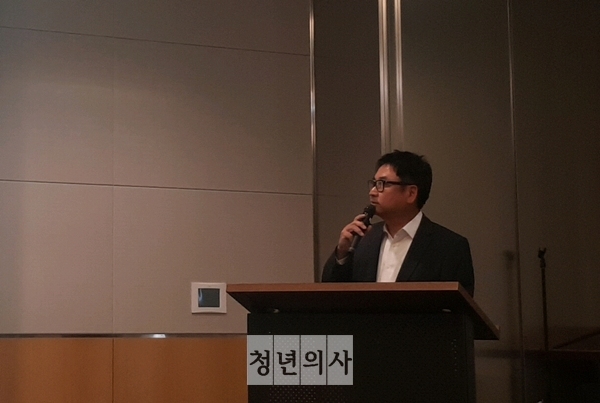“Seeking NASDAQ listing as soon as possible, we will show the excellent efficacy of ‘Super NK (Natural Killer)’ cell therapy in the global market.”
So said Park Sang-woo, CEO of NKMax, at an investor relations briefing in Yeouido, Seoul, Tuesday, announcing the plan for NKMax America, a U.S. subsidiary, to go public on the U.S. stock exchange.

While many other developers of cell-based immunotherapies focus on T cells, NKMax concentrates on NK cells, which have drawn relatively less attention.
The company said its unique technology had overcome the limitations of existing NK cell therapies such as the lack of mass production and low purity. The biotech firm named its high-purity NK cells as “Super NK cells.”
“It is difficult to develop NK cell therapies because proliferating NK cells that have already been isolated is not easy. However, we have a technology to cultivate highly active NK cells in patients at almost the same level in healthy people, with 98 percent of purity,” Park said. “We can mass propagate high-purity NK cells and plan to apply them to various diseases.”
The company uses a simple method in Super NK cell therapy. It takes out 60 mL of peripheral blood from a patient’s body, separate NK cells and cultivates them using the company’s platform technology. It can earn about 2.5 million effective NK cells highly capable of killing cancer cells. Then, the company mass propagates 2 billion to 6 billion NK cells in vitro and inject them into the patient’s body so that NK cells can kill cancer cells.
NK cells are classified as autologous immune cells because immune cells are injected back to the patient.
NKMax is conducting trials on the autologous NK cell therapy in patients with cancer. In the U.S., the company is working on a phase-1 trial in patients with refractory cancer that does not respond to existing treatments. In Korea, the company plans to enter a phase-1 study in solid cancer patients.
NKMax is also studying the autologous NK cell therapy in combination with other existing anticancer drugs. The most advanced trial is on a combo with Keytruda in non-small cell lung cancer. The study is taking place in Korea. In the U.S., the company plans to conduct a phase-1 trial as a monotherapy in various solid cancers and try out a phase-2 study on various combo therapies using the autologous NK cell treatment.
NKMax’s other research includes applying the NK cell therapy to autoimmune diseases such as psoriasis and rheumatoid arthritis and the prevention of cancer recurrence.
As Japan and Mexico categorize autologous NK cell therapies as regenerative medicine, the company received approval from institutional review boards to treat patients. More than 200 cancer patients have been treated with Super NK cell therapy so far, the company said.
“Among patients who received Super NK cell therapy to prevent cancer recurrence, three patients showed improvement in Alzheimer’s disease,” Park said. “We are discussing with the U.S. Food and Drug Administration whether we can win approval for a trial of the NK cell therapy for Alzheimer’s indication, with human data without an animal test model. We plan to do it later this year.”
Park said he anticipated that autologous cell-based immunotherapies could be allowed in Korea if the National Assembly passes a bill to support advanced regenerative medicine and high-tech biopharmaceuticals.
According to Park, autologous cell therapies are authorized as regenerative medicine treatment in Japan and Mexico. Recently, Thailand and Taiwan changed the category of autologous cell therapy from a drug to a regenerative medicine treatment, he said. In Europe, it is possible to get the treatment if two physicians with key opinions apply for it at a hospital.
“In Korea, the high-tech/regenerative medicine bill is pending, but I heard the bill is likely to pass the National Assembly in July or August,” Park said.
To compete and raise funds in the global market, the company is pushing for NASDAQ listing. NKMax selected U.S. law firm, Cooley, to manage its initial public offering (IPO). Unlike in Korea, a company picks a legal partner to prepare for IPO and selects a securities firm later.
Park went on to say that his company was actively working to attract investments in the U.S. Helen S. Kim, a business strategy advisor at NKMax America, led Gilead Sciences’ acquisition of Kite Pharma, a biotech firm that developed a chimeric antigen receptor (CAR) T-cell therapy.
“With the help of advisors and Cooley, we had the first IR session at three venture capital companies. Venture capitalists said Super NK cell therapy could resolve the issue of CAR-T therapies’ shortcomings, which big pharmaceuticals are also working on,” Park said. “There will be no big trouble for a U.S. firm to get funding.”
Park expected that the company would complete building the Good Manufacturing Practice (GMP) system in the U.S. this year and go public on NASDAQ as soon as possible.
“If we get clinical data before or after IPO, we will seek an optimal strategy such as out-licensing or M&A,” he added.

